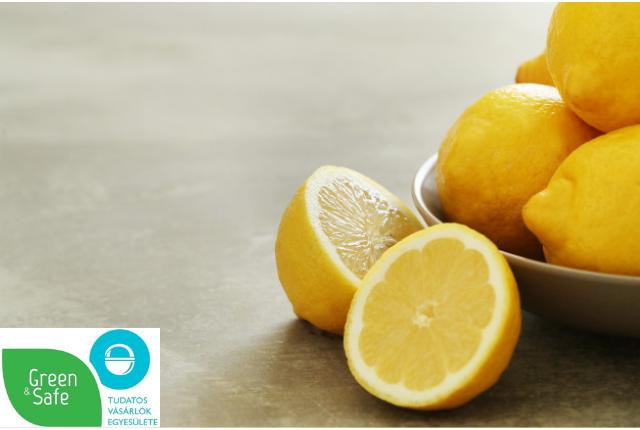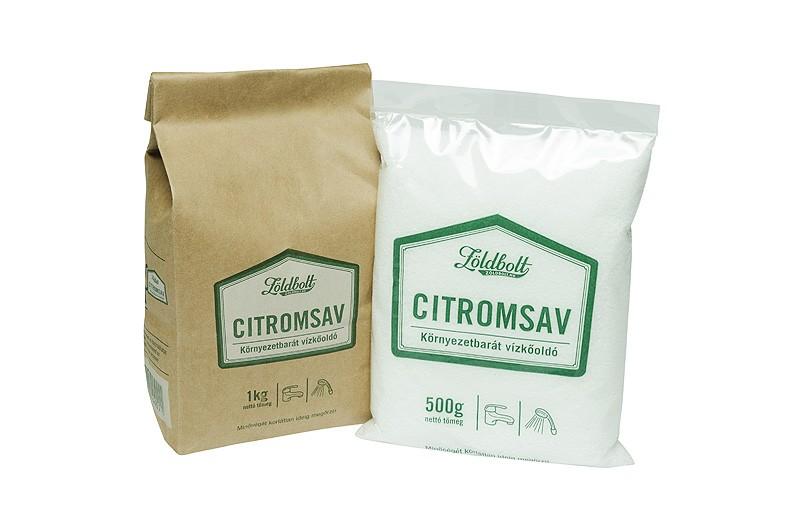
Green Cleaning Best Practices – Citric Acid
It is white, crystalline and you use it instead of vinegar…what is it? The versatile citric acid is used by many to make syrups only, even though it could be a very useful companion of ours in many places of the household. Here is how you could use citric acid as fabric softener, descaling, cleaning the toilet – or a hairwash. Article by Kati Szirmay, our green household guru.
So how is this green?
Citric acid, although its name suggests otherwise, is most often made from corn starch (which can be produced cheaply in large quantities), corn germ liqueur (this is an industrial by-product), molasses (this is also an industrial by-product), or other low-sugar, low-cost plant material. It can be found in many natural sources, most notably in citrus fruits, for example, 5-8% of lemon juice is citric acid.
It’s 100% natural substance, the same compound as that extracted from citrus. It has no harmful side effects and WHO also recommends its consumption.
Similarly to baking soda, it can be used for both cooking and cleaning. It is a gentler acid than vinegar and yet effective. Citric anhydrate (i.e., a crystal that does not contain water) can be used dissolved in water. Compared to vinegar, it is easier to apply to surfaces that are otherwise difficult to clean, as it is solid. Also, it can be mixed with solid detergents to make dishwasher tablets and bath bombs.
The advantage is that although citric acid dissolved in water is not odorless, anyone who has a hard time smelling vinegar can try citric acid instead!
![]()
How is it used?
Citric acid is a gentler acid than vinegar, so much so that coffee machines are often explicitly prohibited to be cleaned from limestone with vinegar, and citric acid is recommended instead. This is because citric acid dusts limescale, while vinegar often separates larger blocks, which can clog the coffee maker. In addition, vinegar can etch surfaces to which citric acid does not pose a risk.
You can read more about hazardous household chemicals and safe alternatives, products and solutions in our Green Home section.
Citric Acid as Fabric Softener: Anyone who doesn’t like the smell of vinegar but wouldn’t like to use a commercial fabric softener anymore can try citric acid water.
Put 1-2 teaspoons of citric acid in a smaller bowl and mix it with lukewarm or warm tap water – it dissolves faster in warm than in cold water. Stir slightly until the crystals dissolve, then place in the rinsing compartment. Add essential oil or washing perfume if you wish.
Put this into the dishwasher rinse compartment: Dissolve 1-2 tablespoons of citric acid in as much warm water as can fit in the rinse compartment of the dishwasher. Increase the amount of citric acid if you think you need to.
Add it to your dishwasher detergent liquid: By adding 1-2 teaspoons of citric acid to your dishwashing detergent you can prevent the glasses from becoming cloudy. Or, make your own DIY mix! Here’s a recipe option: 4 units of baking soda, 2 units of table salt, 2 units of baking soda, 1 unit of citric acid, 1 unit of stain remover salt. If, for some reason, the mixture is not ideal, try increasing the proportion of citric acid or baking soda.
Enhance the effectiveness of the stain remover salt (also known as oxygen bleach, sodium percarbonate):You can enhance the effect of the stain remover salt with a little citric acid – this doesn’t work in case of long soaking or washing at temperatures above 50 degrees. For a white wash at 40 degrees, 1 tablespoon of stain remover salt and 1 teaspoon of citric acid will help start the process.
Descale the washing machine with citric acid: Put 2-3 tablespoons of citric acid in the empty drum and start a short program at 40°C without clothes.
General descaling and cleaning – the dry method: In order to dissolve the limescale, spray the surface with citric acid, then scrub as needed.
General descaling and cleaning – DIY spray: Place 1-2 teaspoons of citric acid in a 100 ml spray bottle, make up to volume with warm water and shake. Once the citric acid has melted, you can start spraying on the surface you want to clean. In the case of a larger vial, increase the amount of citric acid proportionally. It is advisable to store this mixture for a maximum of 1-2 weeks, so it is better to prepare the amount that is needed at that time. You can use the mixture to clean tiles, kitchen countertops, or even windows.
Clean your electric kettle: Put 1-3 tablespoons of citric acid per liter in a descaled kettle and let it stand. If necessary, you can speed up the process by boiling the water in the kettle.
Clean your coffee machine:Put water and citric acid in the water compartment of the coffee machine as recommended by the installer, or with 1 tablespoon per liter, then “boil”. Air the kitchen.
Descaling gel for vertical surfaces with an extra amount of limescale: You can also make a gel limescale remover from citric acid, e.g. Solagum (or Xanthan) with natural gelling agent and water.
Clean the toilet with citric acid: Because citric acid is solid, it can come in handy when descaling a flat-bottomed German-style toilet bowl. Sprinkle the limescale flange around the bottom of the bowl and leave to act. After a few hours scrub with the brush. After that rub with the baking soda. You can pour the baking soda to the citric acid water, creating a strong effervescence that produces carbon dioxide and additional dirt may be removed from the bowl.

Bottle your fruits with citric acid: Citric acid helps preserve non-acidic ingredients (typically sweet fruits), and thanks to its effect, apple slices put in water mixed with a bit of citric acid do not turn brown and will give your bottled fruits a pleasant, sour taste.
Citric acid is useful in bottled fruits and syrups because it helps prevent botulism, a rare but very dangerous disease that can be caused if something went wrong when you had bottled the fruits.
Citric acid for hairwash: Most shampoo soap users need to rinse with vinegar, lemon or citric acid and water in order to counteract the alkalinity of the soap (shampoo soap is not the same as solid shampoo, as the latter does not require rinsing). Depending on the length of your hair, the amount can be doubled.
Citric Acid for Bath Bombs: You can mix the ingredients of a homemade bath bomb according to several different proportions. It is the citric acid and the baking soda that produce the foaming effect – as described for toilet cleaning. Cornstarch helps to create the right texture, you can add table salt, flower petals, vegetable oils, butters, essential oil… you can go as far as your imagination goes.
![]() Caveats
Caveats
Citric acid is produced under controlled conditions in a closed container by black mold fungi. Conclusion:
if used in a humid, poorly ventilated area, such as a very poorly ventilated bathroom, citric acid may begin to mold over time.
The same happens if the dosing tank of the washing machine is always kept closed in a humid bathroom. In this case, replacing citric acid with vinegar almost immediately solves the problem of molding. If you know that this is the case in your bathroom, use vinegar from day one.
The drip tray next to the sink can be an issue too: if you wash your dishes several times a day and the tray can’t really dry out, descale it with vinegar. An aqueous solution of citric acid molds easily too. Do not store mixed citric acid water for a long time, use it within a week. In its crystalline state in a dry place it can keep indefinitely.
![]() Let’s do the maths
Let’s do the maths
Citric acid can be purchased for up to 1199 HUF/kg (Zöldbolt (“Green Shop”) 1 kg citric acid), of which approx. 10-20 liters of descaling liquid can be prepared. This means a price of 60-120 ft per liter, water consumption not included. The cheapest limescale remover on offer is 545 HUF per litre (calculated at Tesco webshop prices) and may contain hazardous substances that will get in contact with your bathroom and even with your kitchen surfaces (which get in contact with food).
![]() Packaging
Packaging
In addition to non-degradable plastic packaging, citric acid is also available in paper packaging. Go for the paper package!

Green&Safe LIFE-styles project is supported by the LIFE programme of the European Union and co-financed by the Hungarian Ministry of Agriculture. Project number: ENV GIE HU000622


